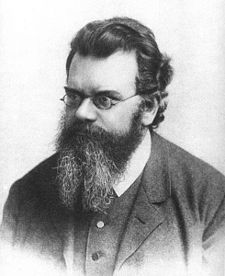by Yanick Toutain
RevActu
Ludwig Boltzmann the real father of the 3rd quantic revolution (after Puthagoras, Leúkippos and Democritos for the first and Isaac Newton for the 2nd) instead of Max Planck.
The energetists criticized him all his life, gave full honors to another after his victory in 1900 and he ended up hanging himself.
In his diary (which I've read translated in French) Max Planck paid homage to the great Boltzmann even specifying his own skepticism about the atomic nature of matter.
Planck confessed that he "consistently refused" to listen to reason.
At this time the "energetists" obscurantist were as powerful "in science" that are currently relativists.
Moreover, the refusal of the atoms never stopped ....
The unluckiest is Boltzmann far!
(abstract on Wikipedia) Boltzmann's kinetic theory of gases seemed to presuppose the reality of atoms and molecules, but almost all German philosophers and many scientists like Ernst Mach and the physical chemist Wilhelm Ostwald disbelieved their existence. (...) Furthermore, Ostwald and many defenders of "pure thermodynamics" were trying hard to refute the kinetic theory of gases and statistical mechanics because of Boltzmann's assumptions about atoms and molecules and especially statistical interpretation of the second law.
Around the turn of the century, Boltzmann's science was being threatened by another philosophical objection. Some physicists, including Mach's student, Gustav Jaumann, interpreted Hertz to mean that all electromagnetic behavior is continuous, as if there were no atoms and molecules, and likewise as if all physical behavior were ultimately electromagnetic. This movement around 1900 deeply depressed Boltzmann since it could mean the end of his kinetic theory and statistical interpretation of the second law of thermodynamics.
After Mach's resignation in Vienna in 1901, Boltzmann returned there and decided to become a philosopher himself to refute philosophical objections to his physics, but he soon became discouraged again. In 1904 at a physics conference in St. Louis most physicists seemed to reject atoms and he was not even invited to the physics section. (...)
In 1905 Boltzmann corresponded extensively with the Austro-German philosopher Franz Brentano with the hope of gaining a better mastery of philosophy, apparently, so that he could better refute its relevancy in science, but he became discouraged about this approach as well. In the following year 1906 his mental condition became so bad that he had to resign his position. He committed suicide in September of that same year by hanging himself while on vacation with his wife and daughter near Trieste, Italy.[10]
| Ludwig Boltzmann | |
| Born | Ludwig Eduard Boltzmann February 20, 1844 Vienna, Austrian Empire(present-day Austria) |
|---|---|
| Died | September 5, 1906 (aged 62) Tybein near Trieste, Austria-Hungary (present-day Duino, Italy) Suicide |
| Residence | Austria, Germany |
| Nationality | Austrian |
| Fields | Physics |
| Institutions | University of Graz University of Vienna University of Munich University of Leipzig |
| Alma mater | University of Vienna |
| Doctoral advisor | Josef Stefan |
| Doctoral students | Paul Ehrenfest Philipp Frank Gustav Herglotz Franc Hočevar Ignacij Klemenčič |
| Other notable students | Lise Meitner |
| Known for | Boltzmann constant Boltzmann equation Boltzmann distribution H-theorem Maxwell–Boltzmann distribution Stefan–Boltzmann constant Stefan–Boltzmann law Maxwell-Boltzmann statistics Boltzmann factor |
| Signature | |













Aucun commentaire:
Enregistrer un commentaire